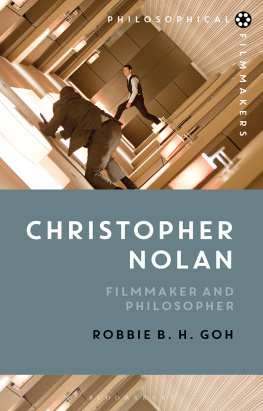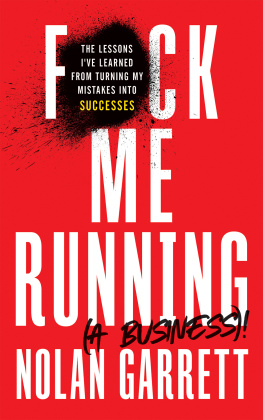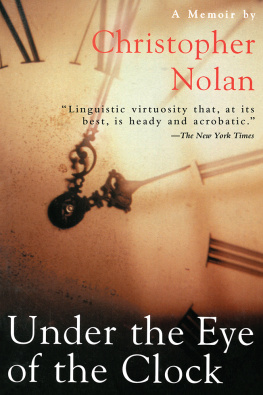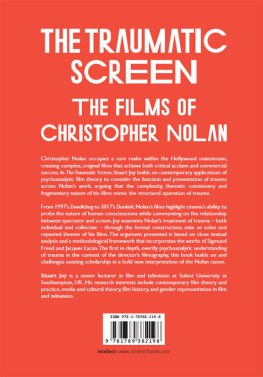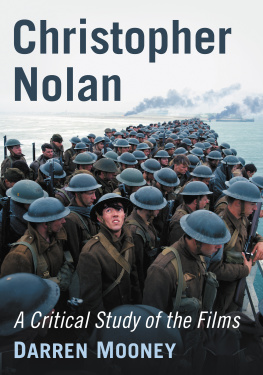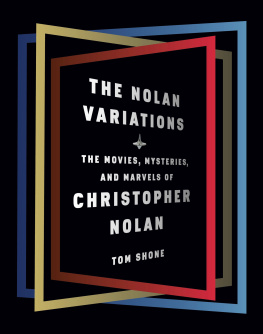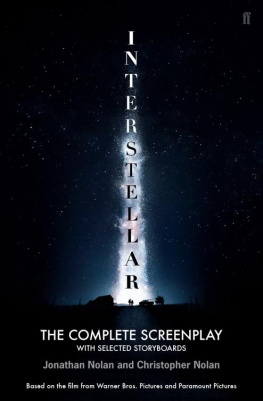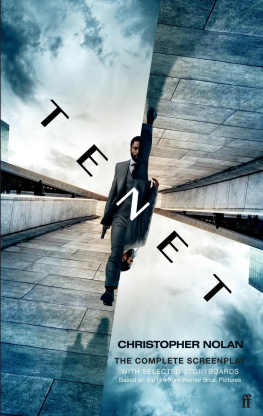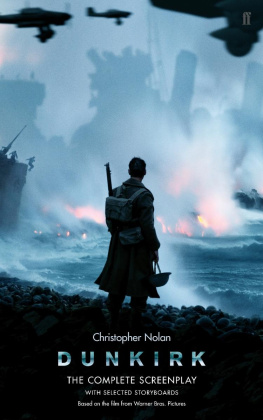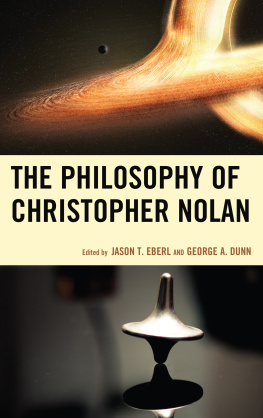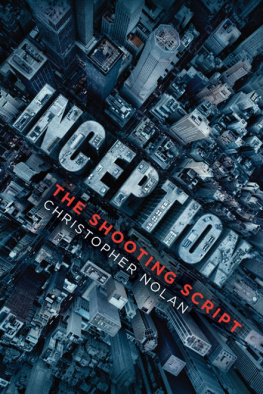CHRISTOPHER NOLAN
PHILOSOPHICAL FILMMAKERS
Series editor: Costica Bradatan is a Professor of Humanities at Texas Tech University, USA, and an Honorary Research Professor of Philosophy at the University of Queensland, Australia. He is the author of Dying for Ideas: The Dangerous Lives of the Philosophers (Bloomsbury, 2015), among other books.
Films can ask big questions about human existence: what it means to be alive, to be afraid, to be moral, to be loved. The Philosophical Filmmakers series examines the work of influential directors, through the writing of thinkers wanting to grapple with the rocky territory where film and philosophy touch borders.
Each book involves a philosopher engaging with an individual filmmakers work, revealing how it has inspired the authors own philosophical perspectives and how critical engagement with those films can expand our intellectual horizons.
Other titles in the series:
Eric Rohmer, Vittorio Hsle
Werner Herzog, Richard Eldridge
Terrence Malick, Robert Sinnerbrink
Kenneth Lonergan, Todd May
Shyam Benegal, Samir Chopra
Douglas Sirk, Robert B. Pippin
Lucasfilm, Cyrus R. K. Patell
Other titles forthcoming:
Leni Riefenstahl, Jakob Lothe
Jane Campion, Bernadette Wegenstein
CHRISTOPHER NOLAN
Filmmaker and Philosopher
ROBBIE B. H. GOH

Research on this book was funded in part by an HDRSS grant from the National University of Singapore. I am grateful for this financial support which allowed me to acquire the necessary material.
To series editor Costica Bradatan I am grateful for conversations, the exchange of ideas, comments and advice which have all fed into this volume.
The anonymous reviewers of the original book proposal and (especially) of the complete draft made many useful comments and suggestions which have all helped in the shaping of this book in its final form.
At Bloomsbury, Frankie Mace, Liza Thompson and particularly Lucy Russell were very helpful and efficient in their handling of this project, and I owe them my thanks.
To my Heavenly Father, as always, I am grateful for His love and guidance, and the way He inspires our philosophy, ideas, morals and culture for in Him we live, and move, and have our being.
Introduction: Nolans philosophical world view
Christopher Nolan as philosophical filmmaker is elusive, almost enigmatic. Starting out as a maker of Indie films (Following, 1998; Memento, 2000), he has gone on to helm large-budget superhero movies (his Batman trilogy of 2005, 2008 and 2012), historical movies (Dunkirk, 2017) and science fiction (Interstellar, 2014; Tenet, 2020). When Inception appeared in 2010, it generated a considerable amount of viewer discussion because of its ambiguities and layering of dreams-within-dreams; yet at the same time, Nolan considers himself a storyteller who does not want his audiences to watch his films in an overly cerebral way (Berman 2017). For all the lauded thoughtfulness and detail in his films, the action sequences in films like Inception or his trilogy of Batman films can be as taut and fast paced as that of directors known only for action films, such as John McTiernan or Antoine Fuqua. A traditionalist of film technique who refuses to film in digital format or (as far as possible) to use CGI effects, he nevertheless favours filming in IMAX and believes that his films would be very conducive to converting to 3-D (Resner 2012).
One of the most intriguing aspects of Nolan as filmmaker is the way in which he incorporates philosophical ideas into films in which suspense, action and even violence feature quite prominently. The contrast with such philosophical filmmakers as the Frederico Fellini of La Dolce Vita, or the Ingmar Bergman of The Seventh Seal, or the Henry Jaglom of Venice/Venice, is pointed. Great philosophical films grapple with certain broad philosophical themes in common such as existential meaning, the morality of actions, the individual and society, appearance versus reality and these make their appearance in Nolans films as well. However, in terms of his ability to incorporate these themes into suspense films, the more appropriate comparisons might be with Alfred Hitchcock or Stanley Kubrick. Yet Nolans films also have more elements of the Hollywood blockbuster with large sets and large-scale action, and an abiding concern for keeping the audience engaged and enthralled than the works of filmmakers like Hitchcock or Kubrick, but at the same time are more intentionally thoughtful and self-reflexive than the typical consumerist action film.
As difficult as it may be to categorize Nolan and compare his films with the work of any other single filmmaker, it is equally difficult to identify a single consistent philosophical thread or position running through his films. If Bergmans films are known for their ongoing dialectic between death/absurdity and life/meaningfulness, their theological atmosphere bathed in the Christian sensibility, rich in Lutheran overtones, that was the fruit of Bergmans upbringing (Gervais 1999: 80, 81), it is much harder to identify a single philosophical strand that truly underlies Nolans oeuvre. The philosophical concerns in Nolans films are far more varied, lacking an easily identifiable signature theme.
On the surface, a likely candidate for Nolans philosophy might be the epistemological themes that feature prominently in a number of Nolans films. In Nolans very first film, Following (1998), redolent with Hitchcockian suspense and plot twists, the young protagonist follows the lead of a burglar (Cobb) and subsequently becomes involved with an attractive girl (the Blonde) and carries out a burglary and assault at their behest, only to find out that things are far from what they seem, with the truth hidden behind multiple layers of appearances. The theme of epistemic uncertainty comes to the fore in Memento (2000), where the protagonist Leonard, who suffers from anterograde amnesia, investigates his wifes murder and makes mnemonic devices out of polaroids, notes and tattoos. Without the ability to remember what transpires the day before, his quest for the truth based on very uncertain data that he constructs for himself, Leonard (like the Young Man in Following) is prey to manipulation by others for their own agendas and is also not above forcing the data into an interpretation that suits his own purposes. The uncertainty of knowledge and the evasiveness of truth appear among the themes of films like The Prestige (2006), which is about a competition between rival illusionists, and in the science fiction film Interstellar (2014), where data is made uncertain by the space-time disruptions of a black hole. Epistemology is central in Inception (2010), a thriller based on the premise of dream-manipulation and the possibility of dreams-within-dreams.
It is thus hardly surprising that much of the scholarship on the philosophy of Christopher Nolan has focused on epistemology and related issues of illusion, self-deception, memory and desire. Inception, especially, has come in for particular attention, its premises of dream-action and dreams-within-dreams invoking the philosophical thought of Plato, Descartes and Zhuangzi (Botz-Bornstein 2011: viiviii; Wenmackers 2011: 8). The films exploration of the possibility of planting an extraneous thought into the mind of another (inception) while concealing the fact that it comes from someone else has provoked comparisons with William Jamess psychology of attention and John Deweys choice of action (Testerman 2011: 689). The possibility of an inception (particularly in ones vulnerable dream state) raises related issues of choice and free will and even larger issues of individuality and the self (Fitzpatrick and Johnson 2012).
Next page
